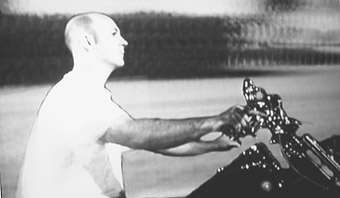Exploding tears, hyperreal longing
Daniel Palmer: John Meade, Propulsion

John Meade, Propulsion
John Meade’s Propulsion integrates the enigmatic moment of perception by revealing the body as a permeable surface. A video installation of the senses, the first thing to penetrate you is sound. To be precise, it is the sound of a distant piano motif which could be Satie or some other early 20th century romantic—but which is actually a looped series of Glen Gould variations, isolated and slowed down by emerging Melbourne artist, Jophes Flemming. The sound immediately installs us in a certain psychosomatic state—namely, melancholia—prior to the viewing of the video imagery.
Emerging from the darkened gallery space, 2 large perspex panels suspended from the ceiling emit bright, almost hallucinatory images. They face one another as floating apparitions that we can walk around and immerse ourselves in. Their ever-flowing images present 2 carefully staged, hyperreal scenes. One shows a man on a sparkling motorcycle, superimposed over a moving background of saturated green countryside and blue sky (as well as a mass of electricity and telephone wires). With no helmet or gloves, and with exposed hairy arms, he appears naked, or at least vulnerable. While he stares ahead for the duration of the video loop, our attention is drawn to his organ of sight, exaggerated by makeup or a certain camp tenderness. Occasionally we see a close up of his eyes, in profile. Eventually, a tear forms, and as it rolls off his cheek it unexpectedly transmutes into an ephemeral explosion—a subtle jouissance, rendered as an animated firework-like white spray.
The screen opposite depicts an equally dream-like configuration of time and space, with even less narrative drive. Another man flies through the air, his body outstretched horizontally, desperately struggling to maintain his position by clutching on to 2 handrails. His billowing T-shirt reveals a toned stomach and arms, but essentially these are ordinary, fragile bodies on display—actively passive. The imagery and music combine to produce a theatrical space, a potential bond of socialisation which dramatises the affective relation between the bodies and the viewer. A strange longing results, somehow nostalgic, overflowing the perpetual present of the video imagery.
Meade’s work—his sculptural objects and images—can be understood as meditations on the capacities of our gaze and of our bodies, conceived within the limits of human finitude. Inevitably, his art returns us to the idea and operation of the unconscious—desire, pleasure, repression and drives. Propulsion solicits our identifications in a subjective experience of duration. We are seduced towards a sense of meaning, figured as an excess. The work leaves us both melancholic and affirms a positive intensity, elegantly figuring the body as a source of desire and fear, sadness and joy, agent of the self to itself and to the outside world.
Propulsion, John Meade, Australian Centre for Contemporary Art, Melbourne, June 8 – July 15. This exhibition originally appeared at the Art Gallery of NSW.
RealTime issue #44 Aug-Sept 2001 pg. 38






